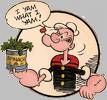 I don't know where "Popeye The Sailor Man" got his supply of can spinach from, but I'm sure it wasn't from California where three-fourths of the U.S.'s supply of fresh spinach comes from. Most recently, health officials in the U.S. have traced a deadly out-break of the E. coli bacteria to contaminated spinach grown in Central California which sickened nearly 200 people around the U.S. and killed one elderly woman. All no doubt were trying to eat spinach, live long and prosper. But they would have been better off eating a marijuana brownie instead.
I don't know where "Popeye The Sailor Man" got his supply of can spinach from, but I'm sure it wasn't from California where three-fourths of the U.S.'s supply of fresh spinach comes from. Most recently, health officials in the U.S. have traced a deadly out-break of the E. coli bacteria to contaminated spinach grown in Central California which sickened nearly 200 people around the U.S. and killed one elderly woman. All no doubt were trying to eat spinach, live long and prosper. But they would have been better off eating a marijuana brownie instead.
As a small child I remember my mother coaxing and pleading with me to eat my spinach, because it was good for me. "Good" is a relative term, and it greatly depends on which side of the fork you are on. As far as I was concerned, eating spinach was a form of culinary child abuse. When pleas didn't work, my mother would take to threatening me like Joan Crawford in "Mommie Dearest."
Now an adult, I no longer have an adversion to eating spinach. And it would not be out of the question to find me dining on a salad of grilled chicken, cucumbers, tomatoes, cubed cheese and baby leaf spinach, until recently. As luck would have it, a day before the news broke about the E coli outbreak, I purchased a bag of baby leaf spinach to make the meal I just described. But I was too lazy to grill the chicken for the salad, and I opted to wait until the next evening to cook the chicken. The next morning there was a nation wide alert all over the news telling everyone in the U.S. not to eat bagged spinach. My grandmother always said, "God looks out for babies and fools." Since I haven't worn diapers since I was 2, I guess I'm the lucky fool. But I may be forced to wear diapers again when I am 82. After the alert hit, restaurants and grocery stores stopped offering spinach. And the leafy vegetable was as scarce as Osama Bin Ladin. Weeks later, I walked into the grocery store to find to my surprise that bagged spinach was on the shelf again. So guess what I am having for dinner tonight?






